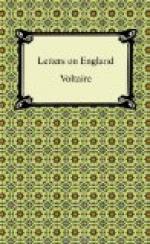The custom of introducing love at random and at any rate in the drama passed from Paris to London about 1660, with our ribbons and our perruques. The ladies who adorn the theatrical circle there, in like manner as in this city, will suffer love only to be the theme of every conversation. The judicious Mr. Addison had the effeminate complaisance to soften the severity of his dramatic character, so as to adapt it to the manners of the age, and, from an endeavour to please, quite ruined a masterpiece in its kind. Since his time the drama is become more regular, the audience more difficult to be pleased, and writers more correct and less bold. I have seen some new pieces that were written with great regularity, but which, at the same time, were very flat and insipid. One would think that the English had been hitherto formed to produce irregular beauties only. The shining monsters of Shakspeare give infinite more delight than the judicious images of the moderns. Hitherto the poetical genius of the English resembles a tufted tree planted by the hand of Nature, that throws out a thousand branches at random, and spreads unequally, but with great vigour. It dies if you attempt to force its nature, and to lop and dress it in the same manner as the trees of the Garden of Marli.
LETTER XIX.—ON COMEDY
I am surprised that the judicious and ingenious Mr. de Muralt, who has published some letters on the English and French nations, should have confined himself; in treating of comedy, merely to censure Shadwell the comic writer. This author was had in pretty great contempt in Mr. de Muralt’s time, and was not the poet of the polite part of the nation. His dramatic pieces, which pleased some time in acting, were despised by all persons of taste, and might be compared to many plays which I have seen in France, that drew crowds to the playhouse, at the same time that they were intolerable to read; and of which it might be said, that the whole city of Paris exploded them, and yet all flocked to see them represented on the stage. Methinks Mr. de Muralt should have mentioned an excellent comic writer (living when he was in England), I mean Mr. Wycherley, who was a long time known publicly to be happy in the good graces of the most celebrated mistress of King Charles II. This gentleman, who passed his life among persons of the highest distinction, was perfectly well acquainted with their lives and their follies, and painted them with the strongest pencil, and in the truest colours. He has drawn a misanthrope or man-hater, in imitation of that of Moliere. All Wycherley’s strokes are stronger and bolder than those of our misanthrope, but then they are less delicate, and the rules of decorum are not so well observed in this play. The English writer has corrected the only defect that is in Moliere’s comedy, the thinness of the plot, which also is so disposed that the characters




